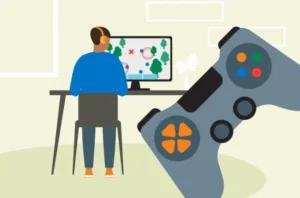
Playing multiplayer online video games generates social capital and sense of belonging. The communication behaviors with players of different relationship types, the extroversion and materialism of players and demographic variables impact these outcomes.
Maintaining social relationships is an important aspect of psychological well-being, particularly for older people living in retirement homes. Researchers compared the effects of two types of online, socially interconnected video games on the interaction between older players living in retirement homes and their younger coplayers.
Social Benefits
Multiplayer video games provide a social space for individuals to connect and form social relationships with other players. These social connections can be made locally on the same computing system (couch co-op), across different systems over a local area network, or over a wider area network such as the internet.
Communication and collaboration between players in multiplayer games fosters camaraderie and enables players to develop problem-solving skills, analytical thinking and strategic planning. This can also lead to a greater sense of achievement and progression, encouraging player satisfaction.
Computer networking has transformed gaming from a solitary activity into a thriving social experience. Matchmaking systems help to connect players with opponents of similar skill levels, fostering healthy competition and building communities of dedicated gamers. Satisfied players often recommend their favorite games to others, promoting organic community growth and long-term retention. This translates into a high revenue stream for game developers and a thriving online gaming experience. Various gameplay experiences are available to satisfy the varying needs and preferences of gamers, but balancing this with server performance and player base size can be challenging.
Sense of Belonging
In addition to fostering social connections and teamwork, multiplayer games also offer players the opportunity to experiment with different identities and personas. The freedom of self-expression that comes with gaming can be especially empowering for individuals who may not feel as though they have the same opportunities in their everyday lives.
A sense of belonging is a core human need that can be enhanced through various means, including social, spatial, cultural, and professional connections. The feeling of belonging is linked to positive life outcomes such as self-esteem and psychological well-being.
This research aims to investigate the impact of multiplayer game behaviors and player characteristics on social capital and a sense of belonging generated in games, and their subsequent impact on interdependent well-being. Results show that communication behaviors with players of different relationship types impact bridging and bonding social capital, while extroversion and materialism affect a sense of belonging in games. These findings can contribute to a better understanding of the metaverse, a virtual world in which people connect with one another.
Communication Skills
In multiplayer video games, it’s necessary for players to communicate effectively with their teammates in order to play the game successfully. This communication often takes the form of teamwork and collaboration. It can also involve problem-solving, which helps gamers improve their logical reasoning skills.
In addition, some multiplayer games call for a team hierarchy, allowing players to try out leadership roles and delegate tasks. This can help gamers develop organizational and leadership skills, which may transfer into their professional lives.
While multiplayer gaming is still in its early stages of development, it’s already becoming a significant part of the gaming experience. Its growth is driven by the demand of gamers and developers. However, it’s important that games companies strike the right balance between multiplayer and single-player modes so as not to leave single-player preferring gamers behind. This will ensure the longevity of the multiplayer gaming industry.
Problem-Solving Skills
Many video games have a bad reputation, being accused of being addictive, violent, and stunting social development. However, research shows that gaming can also improve problem-solving skills.
This is particularly true of role-playing and puzzle games. These types of games require players to think critically and strategically in order to progress. They also encourage creativity by providing players with a variety of challenges to overcome.
In addition, many multiplayer games require cooperation and teamwork. This can help improve communication and collaboration skills, which are necessary for problem-solving in real life.
Lastly, the challenge of overcoming obstacles in a game can teach players perseverance and resilience. This is especially important for young people, as it can prepare them to face the challenges of their workplace. It also promotes the ability to think on one’s feet and react quickly, which is a useful skill in solving complex problems.